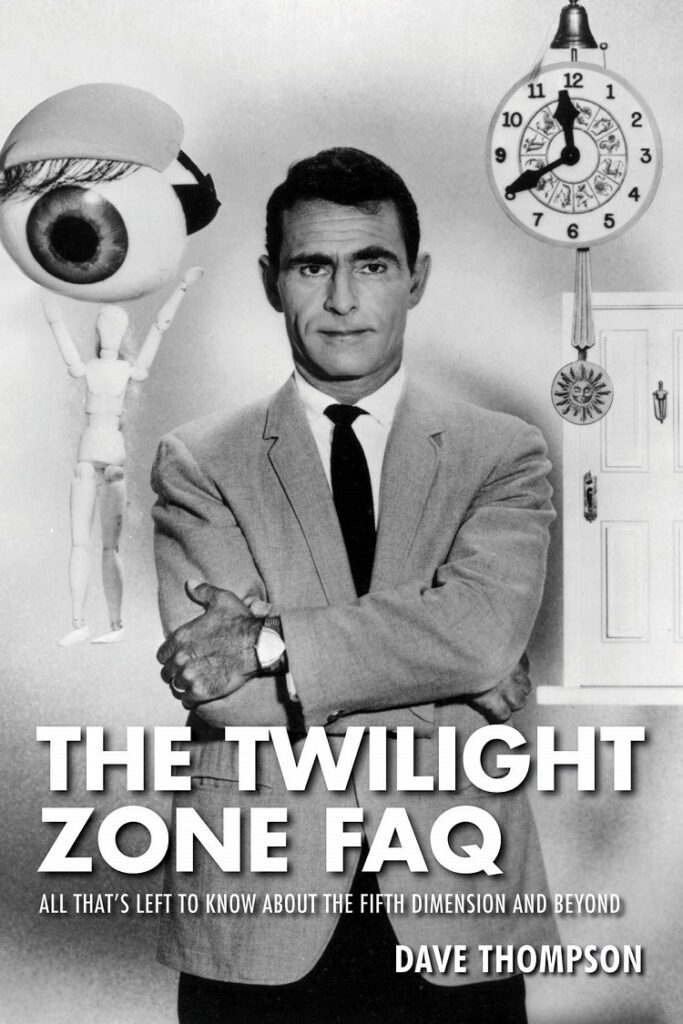
The Twilight Zone… a dimension of sound. A dimension of sight. A dimension of mind. A land of shadow and substance; of things and ideas. Also, a pretty great television show that ran for a total of five groundbreaking seasons and left an indelible mark on popular culture. In The Twilight Zone FAQ, author Dave Thompson takes a look back on this thought-provoking series, reflecting on its birth and creation in the mind of the then-unknown Rod Serling, and following along as it went on to become a cultural touchstone and the blueprint for so many fantasy television series, movies, novels, and even comic books that have been created in its wake.
The book acts not only as a chronicle of The Twilight Zone series, but also as something of a biography of the show’s creator, Rod Serling. By no means is it a complete biography, nor does it intend to be; but by sharing stories of Serling’s early life and career, the reader is granted a bit of insight into the familiar themes of prejudice and social justice which popped up so regularly in The Twilight Zone.
No where is this more evident than in the discussion of Serling’s time spent in the military and his struggles with what we would now refer to as post-traumatic stress disorder, which no doubt shaped his views on the horrors and futility of war. Thompson does little more than scratch the surface of these stories, but it’s just enough to turn on the light bulb in your head as you read and reflect on the show, making connections between the man and his art.
It’s also refreshing to read anecdotes about Serling from his family and colleagues. They say you should never meet your idols, lest you be disappointed by what you might find; but in the case of Rod Serling, it seems that he was a pretty decent guy, loved and respected as an all-around nice fellow who took care of his family and friends.
As for the book, it takes a unique approach to this look back on the series. Rather than dedicate a chapter to each season and detailing that season’s episodes within, author Dave Thompson instead takes a look at the themes, concepts, and creators behind the series. One chapter might open with a brief discussion of Rod Serling’s hatred of prejudice and racism, then go on to discuss several key episodes that dealt with that topic. Another chapter will talk about Serling’s dedication to the finding quality writers for the program while showcasing episodes written by folks like Richard Matheson, Charles Beaumont, or Ray Bradbury.
It’s a unique approach and a bit of a mixed bag. While the chapters seem to progress in a chronological order, detailing the creation, success, and ultimately the cancellation and legacy of The Twilight Zone, I still felt a bit disconnected as I read the book due to its tendency to jump around from topic to topic. It’s almost as though The Twilight Zone FAQ itself came from another dimension – does it want to be a biography? Is it trying to be an episode guide? In the end, it is both of these things and it is neither.
Perhaps it is a failing of my own and not something to be attributed to the book or its author, but as I sat in bed each night, ready to devour another chapter, I found myself simultaneously enlightened by the new information I was learning about the program and frustrated by its brevity. I appreciated Thompson’s injection of his own opinion on the show and his approach to covering the ideas behind it rather than simply offer an episode-by-episode discussion, yet I felt at times that the book was disjointed and unorganized because of it.
In some respects, I got more from The Twilight Zone FAQ than I expected, but at the same time, I was only left wanting more. And as I’ve already suggested, maybe this is a reflection on the reader, not the author? It could be that my own preconceived notions of what I was getting with this book stood in the way of being open to what I was actually receiving. At any rate, this is my review and Dave Thompson is more than welcome to write his own review of my review and offer a rebuttal. In fact, I’d love to talk to the guy about The Twilight Zone – he clearly has a vast knowledge of the series which recognizes the good as well as the bad and the cult of personality that has sprung up around the show and its creator.
Oh, and there actually is a season-by-season episode guide included in the back of the book, so I suppose I don’t really have much to complain about, do I? But still, I could’ve done without that chapter detailing each time that the show was preempted or didn’t air at all. I’m sorry, but for as much fantastic information there is in this book, there’s a bit that feels suspiciously like filler.
At the end of the day, The Twilight Zone FAQ is a pretty good book about a pretty great show and since I haven’t read any other books about the show, nor have I read any biographies of Rod Serling, I will currently rank this book as the best of both. It’s a bit dry at times and maybe it wasn’t intended to be read straight through, from beginning to end like a novel, but to be picked up and perused occasionally like a coffee-table book or an opinionated encyclopedia?
The bottom line is that The Twilight Zone FAQ did shed light on both the production of The Twilight Zone and the man behind it and in doing so, answered some of my frequently asked questions about the series. Since “FAQ” is actually in the title, I’d say that qualifies it as a success.